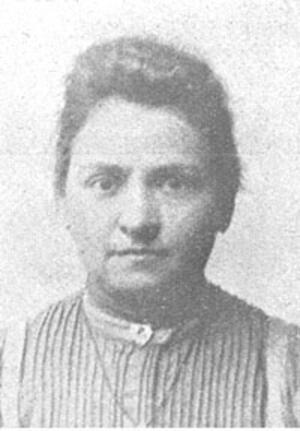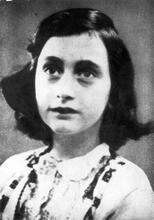Roosje Vos
Roosje Vos, a trade union leader and organizer for the Dutch socialist movement, ca. 1900. Source: Biografisch Woordenboek van het Socialisme en de Arbeidersbeweging in Nederland, via Wikimedia Commons.
Roosje Vos grew up in a Jewish orphanage in Amsterdam. Then, like many poor Jewish girls and women, she was then trained as a seamstress, her entry into the world of labor organizing. She joined the new trade union for seamstresses and began writing and editing for the union’s journal. A charismatic speaker, Vos also became one of the most visible women of the Dutch socialist movement, occasionally leading her to clash with her male counterparts on issues such as women’s suffrage. When she married and moved away from Amsterdam, Vos distanced herself from the movement but remained an advocate for women’s issues. Before her death in 1932, she was the only woman to represent the Dutch Communist Party in a parliamentary election.
The name of Roosje Vos is still significant in Dutch socialist trade-union circles. It stands for education for young socialist women, as evidenced by the fact that trade union training for women was originally named for her. (See the Modern Netherlands.)
Family and Education
Roosje Vos came from a proletarian Jewish family. Her father, Jacob Manus Vos, died when she was six, and although her mother, Schoontje Jacob Fransman, was still alive, Roosje was brought up at the Jewish orphanage in the old Jewish quarter of Amsterdam until the age of fourteen. There she was trained as a seamstress. Her education was strictly Orthodox, much more religious than the dominant Jewish proletarian culture. Until her marriage in 1903, Roosje worked as a seamstress in one of the city’s large workshops, as did many Jewish girls and married women. Better jobs were available in the diamond industry, but at that time only members of diamond workers’ families were accepted.
Trade Unionism and Socialism
In 1897 Vos became active in the new trade union for seamstresses, Naaistersbond Allen Een (All Seamstresses United), which became one of the pioneers of trade union organization while remaining deliberately independent of male organizations. A link must have existed with the nascent feminist movement, since a feminist leader spoke at the union’s first meeting. The seamstresses took part in the National Exhibition of Women’s Work in 1898, which some socialists found too bourgeois. The exhibition, in which many women’s organizations participated, attracted nationwide attention for several weeks. The aim of Roosje Vos and her colleagues was to make the larger public aware of the fate of seamstresses, with their long workdays and low wages. Their agitation may well have been the reason for the exhibition’s increased focus on the social implications of women’s labor. It was not long before the seamstresses’ organization transformed itself into a real trade union with its own journal, De Naaistersbode.(Message to the seamstresses) Although its origins had been among linen workers, it soon managed to unite all seamstresses. Roosje Vos published articles in De Naaistersbode under the pseudonym Ervé. She also wrote three theater pieces that depicted the atrocious conditions for women in the workshops.
From then on Roosje Vos became one of the major figures in the Dutch trade union and socialist movement. A gifted and highly eloquent speaker, she was often the only woman visible at national events, as in 1900 when she addressed an audience of 7,000 flanked by the socialist leaders of the day. In this case she was defending the proposed Industrial Actions Act, which passed into law in the following year.
On several occasions Vos disagreed with other socialist leaders. For example, she rejected the ideal of a ten-hour workday and argued for an eight-hour maximum. She also pleaded for the abolition of cottage industries, which her comrades regarded as a necessary refuge for families that could not otherwise subsist. She supported female suffrage at a time when socialists did not include women in their demands for general suffrage. Despite these disagreements, her position as a socialist leader became more prominent over the years.
In 1903 Vos married Melle Gerbens Stel, a schoolteacher, and moved with him to the northern province of Groningen. The couple had no children. Although she initially tried to continue her work as an editor of De Naaistersbode, she became far removed from her roots and from the union. She became an activist in the socialist movement of her region, choosing to keep a distance from earlier tensions and quarrels within the party.
Suffrage and Communism
Roosje Vos remained a radical on women’s suffrage, pleading openly for the cause of women. When the Radical Socialists and Marxists broke away from the Dutch Socialist Party, she followed them. In the beginning the Radicals were an isolated group in the North, but in 1927 they gained enough votes to participate in the provincial government (Provinciale Staten). The majority of Vos’s followers were agricultural workers, and with them she took part in relief actions for the famine in the Soviet Union. Despite having to care for a sick husband (who died in 1927) she was one of the founders of the Dutch Communist Party (CPH), for whom she was the only female parliamentary candidate. At the end of her life she became active in the communist peace movement. She died of a heart attack in 1932.
Today Roosje Vos is known as a socialist organizer and it is generally assumed that her socialism represented a break from her Judaism. One could well argue, however, that her life followed a pattern similar to that of many radical Jewish women in many parts of the world. From this perspective, her socialist radicalism forms part of a secular Jewish tradition.
Elias, Mirjam. “Roosje Vos.” In Vrouwen rond de eeuwwisseling (Women around the Centenary), edited by Aukje Holtrop, 155-175. Amsterdam: Arbeiderspers, 1979.
Mellink, Albert. “Roosje Vos (1860-1932).” Cahiers over de geschiedenis van de Communistische Partij van Nederland (Journal of the History of the Communist Party) 10 (1984): 123-134.
van Houten, B. Tussen paternalisme en zelfstandigheid. Socialisme en arbeidersbeweging op het Hogeland 1885-1922 (Between paternalism and independence. Socialism and the workers movement at the Hogeland 1885-1922). Groningen: De Arbeider,1985.
Tijenk, Christel. Joodse vrouwen in de Nederlandse vrouwenbeweging (1898-1948) (Jewish women in the Dutch women’s movement (1898-1948)). PhD diss., Nijmegen 1997.
Marijke Waalkens, Vos, Roosje, in Digitaal Vrouwenlexicon van Nederland (Digital Women’s Lexicon of the Netherlands), 2017. http://resources.huygens.knaw.nl/vrouwenlexicon.




